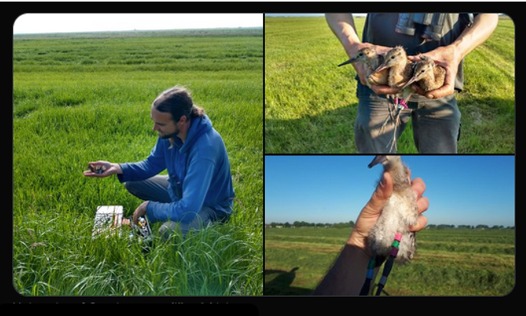BirdEyes and Campus Fryslân collaborate successfully

What do researchers care about when they are in the field, taking hold of birds with their hands? What does it mean if they save a flooded nest of the endangered bird they study? What if this affects the course of events they study?
And to what extent does data collection that is crucial for robust scientific knowledge on population survival also disturb endangered individuals?
These dilemmas illustrate how researchers from BirdEyes deal with the multiple commitments they have. A recent article by Selen Eren and Anne Beaulieu investigates how researchers balance the different ways they care about what they do, alternating between doing research, preserving endangered species, and aligning their data to knowledge infrastructures. The publication is entitled Between a bird-in-the-hand and species data in the bank: Intermittent care in conservation science and published in the journal Theory, Culture & Society.
This publication is the fruit of collaboration between Campus Fryslan and BirdEyes. Other ongoing projects focus on the concept of ‘flyway’ as a boundary object, on unentangling epistemic tensions between university researchers and societal knowledge actors in Friesland, on the development of a hackathon using bird tracking data, and on the creation of tools to support discussions of data equity in migratory bird ecology.
The partnership between the Faculty and the new Science and Creativity Centre for Global Ecological Change at the University of Groningen is the context for the Ph.D. project of Selen Eren from the Knowledge Infrastructures Department. Eren focuses on the scientific knowledge production process of a team of ecologists from BirdEyes. This collaboration brings together social and natural scientists to contribute to the production of scientific knowledge on biodiversity loss needed to build multispecies liveable futures in Friesland.
The collection of data about the rapid decline of godwits (grutto, skries), the Dutch national bird, is the focus of this publication The researcher-bird engagements observed during the ecologists' fieldwork practices are analyzed as care relations. The authors found that knowledge about survival and biodiversity loss emerges thanks to the intermittent character of care, oscillating between its different types (affection, labor, ethical obligation) and matters (individual birds, future populations, knowledge infrastructures). The analysis also shows that uninterrupted affection, labor, or ethical obligation for one matter of care, to the exclusion of the other two, gives rise to ethical and epistemic problems. A balance of care work between these different types and matters of care is necessary, and can be further facilitated by reconfiguring knowledge infrastructures.
| Last modified: | 12 October 2023 10.49 a.m. |
More news
-
16 April 2024
UG signs Barcelona Declaration on Open Research Information
In a significant stride toward advancing responsible research assessment and open science, the University of Groningen has officially signed the Barcelona Declaration on Open Research Information.
-
02 April 2024
Flying on wood dust
Every two weeks, UG Makers puts the spotlight on a researcher who has created something tangible, ranging from homemade measuring equipment for academic research to small or larger products that can change our daily lives. That is how UG...
-
18 March 2024
VentureLab North helps researchers to develop succesful startups
It has happened to many researchers. While working, you suddenly ask yourself: would this not be incredibly useful for people outside of my own research discipline? There are many ways to share the results of your research. For example, think of a...
